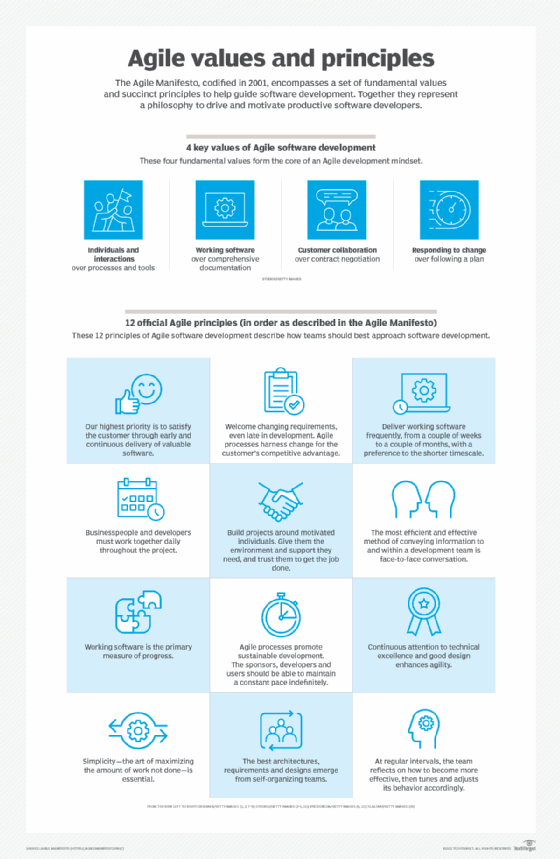What is behavior-driven development (BDD)?
Behavior-driven development (BDD) is an Agile development methodology that documents, designs and develops software around the behavior a user expects to experience when interacting with an app. BDD extends the capabilities of test-driven development (TDD) and acceptance test-driven development (ATDD) by encouraging collaboration among stakeholders and writing plain-language scenarios that can be used as both executable tests and living documentation.
Behavior-driven development aims to ensure that each software release delivers real value that solves a user problem or meets a business need. The methodology's collaborative approach to defining requirements enables all stakeholders to understand requirements the same way, and the methodology's iterative sprints can reduce the time it takes to identify and fix issues.
Benefits of behavior-driven development
The main advantage of BDD is that it improves communication and collaboration between stakeholders with different business priorities and/or levels of technical expertise. To help stakeholders understand an application's purpose and expected behavior, requirements are always expressed as real-world scenarios and are written in plain language. This approach reduces ambiguity and makes it easier for BDD teams to understand the scope of each Agile sprint from a user's perspective.
Another benefit of BDD is that once a scenario has been written, it can be automated once and re-run many times in different contexts. This is important because it allows the same scenario to be used for documentation and testing in both stage and production environments. Focusing on user needs also helps to avoid code bloat. Because BDD requires each functionality to be backed by a behavioral requirement, teams can avoid scope creep and other issues that delay the software development lifecycle (SDLC).
How behavior-driven development works (BDD lifecycle)
A typical project that uses behavior-driven development begins with a conversation between software developers, software testers, product owners and potential end users. The goal is to build a shared understanding of requirements that clarifies expected behaviors in plain language and defines acceptance criteria before any code is written.
Typically, BDD consists of the following steps:
- Discover and gather requirements after discussions with all stakeholders.
- Define potential scenarios in simple, natural (human) language.
- Turn scenarios into automated test scripts with tools like Cucumber or Concordion.
- Develop source code to satisfy defined scenarios.
- Test code to verify functionality works as expected.
- Improve code by incorporating stakeholder feedback.
- Deploy (release) the software when actual system behavior matches expected behavior.
- Maintain the software as requirements evolve over time to ensure that functionality doesn't break.

Examples of BDD scenarios
Once requirements have been identified, BDD teams can write real-world scenarios and turn them into automated tests. Typically, this involves using Gherkin, a domain-specific language (DSL) that doesn't require team members to be experienced programmers.
Instead, Gherkin scenarios use a Given-When-Then format to describe how software should behave. Given sets up the initial context or preconditions, when describes an action or event that triggers the behavior and then specifies the expected outcome or result.
Here are two examples of such scenarios:
Scenario: Successful login
Given that the user is on the website's login page
When the user enters a valid username and password combination and clicks the login button
Then the user will be logged in successfully
Scenario: Add item to a shopping cart
Given the user is on a product page
When the user clicks on "Add to cart"
Then the item will be added to the user's virtual shopping cart
Behavior-driven development testing
In software development, traditional quality assurance (QA) testing verifies whether or not code complies with technical specifications. In behavior-driven development, however, acceptance testing verifies how code behaves in different scenarios. The emphasis on functional specifications instead of technical specifications is beneficial for microservice deployments in continuous integration and continuous delivery (CI/CD) pipelines. Microservices are modular software components that work together as part of a larger application. CI/CD pipelines are automated workflows that integrate code changes, run QA tests to validate the changes and move accepted changes to production quickly and reliably.
In CI/CD deployments, behavior-specific acceptance tests are written before coding begins, so technically, they can be run at the beginning of a project, while a product is still in development or when it is completed. However, it's important to understand that most acceptance tests will fail at the beginning of a project because the functionality hasn't been developed yet. As the development project goes on, however, more tests are likely to pass, and once all acceptance criteria have been met, the software can be released to production.
To facilitate behavior-driven testing, development teams should:
- Consider using the 5 Whys principle to help stakeholders align needs with priorities and outcomes.
- Practice writing user-focused scenarios.
- Consider using automation to turn user-focused scenarios into executable acceptance tests.
- Align acceptance tests with specific user needs and/or business goals.
- Provide a centralized repository for stakeholders to review BDD documentation and project progress.
Popular BDD tools and frameworks
Numerous tools and frameworks are available to help development teams adopt BDD and take advantage of its many benefits. Some of the most popular BDD tools include:
Cucumber. Development and test teams can use Cucumber to write acceptance tests in plain language and then run them automatically.
Behave. Behave is a BDD tool for Python developers. Like Cucumber, Behave lets development teams write scenarios in plain text using Gherkin and execute them automatically through step definitions. (A step definition is a snippet that connects a single line of Gherkin syntax to the automation code that executes it.)
Behave Restful. Python developers and testers can use Behave Restful to test microservices implemented in any language and validate REST APIs.
JBehave. JBehave is a BDD framework for writing and running Java tests. The framework can be integrated with different integrated development environments (IDEs), including Eclipse, to streamline test creation and execution without leaving the development environment.
Mocha. Mocha is a popular JavaScript test framework that runs on Node.js and in web browsers. By default, Mocha executes tests serially to simplify reporting and ensure errors are mapped to the correct test cases. Mocha integrates with a wide range of third-party tools and plugins to support continuous testing and provide Agile workflows with feedback in real time.
Concordion. Concordion is a lightweight BDD framework for Java developers. Tests are written in HTML or Markdown, and Java fixtures (classes) link specifications to executable test code.
Behavior-driven development best practices
Software development teams can take advantage of BDD's benefits while minimizing its challenges by adopting the best practices highlighted below:
- Write test scenarios before writing code.
- Encourage developers, testers and business stakeholders to collaborate on Gherkin scenarios.
- Write scenarios from the user's perspective.
- Keep scenarios short and focused on business, not technology.
- Ensure each scenario verifies a single, clear outcome.
- Reuse step definitions for different scenarios whenever possible.
- Organize scenarios with tags to make them easy to find and use.
- Shorten feedback loops by running scenarios in CI/CD pipelines.
Common challenges and drawbacks of BDD
Although behavior-driven development has many benefits, it also has some challenges. One important challenge is that adopting and adjusting to a BDD approach can have a high learning curve. Developers and other stakeholders must learn how to write plain-language scenarios reflecting real-world concerns. They must also become familiar with using Gherkin in feature files that serve as living documentation and automated acceptance tests.
Another challenge is that technical personnel may struggle to collaborate with non-technical personnel (and vice versa). In organizations with clear lines of demarcation between these two teams, overcoming the cultural differences between different departments can be almost as difficult as accommodating different levels of technical skills.
Behavior-driven design can also be challenging for development teams that have traditionally used Waterfall development strategies. BDD requires scenarios (and therefore acceptance tests) to be written before code, creating a major workflow shift. Larger or more complex projects can also slow the entire software development lifecycle because hundreds of user-focused scenarios can be time-consuming to develop and maintain.
Because BDD can increase complexity and latency in the SDLC, it may not be the right approach for every development project. For small projects, prototypes or highly technical libraries, the additional challenges of BDD deployments may outweigh the benefits, especially in CI/CD pipelines that prioritize speed and simplicity over stakeholder communication.
Learn more about the challenges of CI-CD pipelines and how to overcome them in this comprehensive guide.






